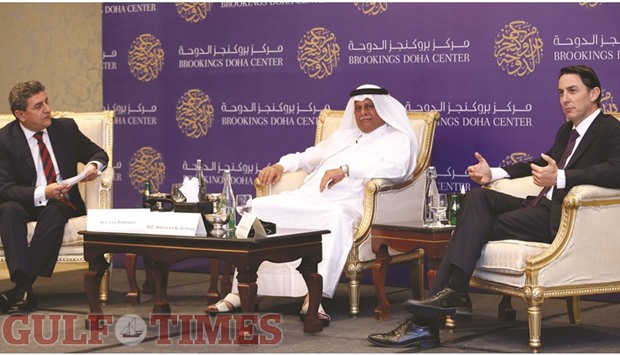Greater demand for liquefied natural gas is seen in many parts of the world because of rapidly developing economies, says HE Abdullah bin Hamad al-Attiyah, former Deputy Premier and Minister of Energy and Industry.
In the 1980s and 1990s, he said the “demand for gas was pretty low” around the world.
“That situation has clearly changed. Now there is demand for gas in Africa, Asia and even in the Middle East, where there are many oil-based economies,” al-Attiyah said at a panel session on “The Role of LNG in a Changing Energy World” hosted by Brookings Doha Center at the Four Seasons yesterday.
Al-Attiyah said many oil-based countries in the region “require more LNG as their domestic consumption has gone up phenomenally.”
“When your economy is growing, you consume more energy; it is simple,” he said.
Qatar, al-Attiyah said, has great advantages over many others as it is an “extremely competitive producer.”
“We have abundant resources and with modern technology we have been able to bring down costs considerably. Qatar also is renowned for its reliability in supply. We have never defaulted even on one cargo. We have a modern and large fleet of our own LNG tankers. We take this business very seriously and value our customers very much,” al-Attiyah said.
Emphasising the importance of technology in the energy industry, he said, “Besides lowering costs, it will improve efficiency. We used to have offshore platforms managed by very many people. Now, a technology-driven platform requires only a handful of operators. Same is the case with a state-of-the-art power generating facility.”
Recounting his experience at a shipyard in South Korea he said, “I was amazed to see that a large Q-Max LNG tanker, which is as big as 10 football grounds, is operated by just 15 people. This has become possible only because of modern technology.”
Al-Attiyah stressed the point that the current low energy prices were cyclical in nature.
“This is not the first time it is happening. And it will not be the last time either. We will need to adapt to the changing market dynamics.”
He said the Doha-based Gas Exporting Countries Forum (GECF) was not “created to be like another Opec.”
“GECF is different from Opec. Opec can decide among other things cutting production. In the gas industry, it is difficult to cut production – because here we have either long-term contracts or ‘take and pay’ deals and no flexibility to store LNG.”
Al-Attiyah said the GECF was created to enhance cooperation between gas producers and consumers and promote LNG as a source of energy.
“We have been able to send across the message that LNG is a cleaner fuel and a good alternative at that.”
Touching upon Qatar’s investment in the Golden Pass LNG Terminal in the US, he said the decision was made in association with US energy companies when the country faced huge shortage in gas supply.
“But when we started to dispatch the first LNG cargoes to the US, the shale gas showed up… and prices started dropping. Now the Golden Pas Terminal is being utilised taking into account the changing market characteristics,” al-Attiyah noted.
Energising the world when 2bn people have no access to electricity was a major challenge to be tackled, said al-Attiyah, also the chairman of Abdullah Bin Hamad Al-Attiyah International Foundation for Energy & Sustainable Development .
The development of the power sector remained a “major challenge” for many countries around the world.
“Every year, we hear about power shortage in many countries in Asia, Africa and Latin America. Electricity is the engine of growth; if you face power shortage, then it means your economy will be very depressed. This is something that needs to be tackled urgently,” al-Attiyah said.

HE al-Attiyah with Amos J Hochstein (right), special envoy and coordinator for International Energy Affairs, US Department of State and Sultan Barakat, director of research, Brookings Doha Center, at the panel session yesterday. PICTURE: Jayaram
